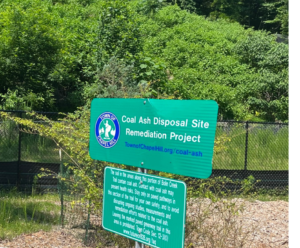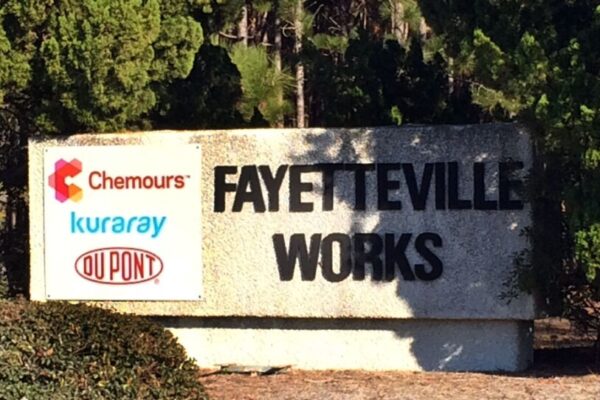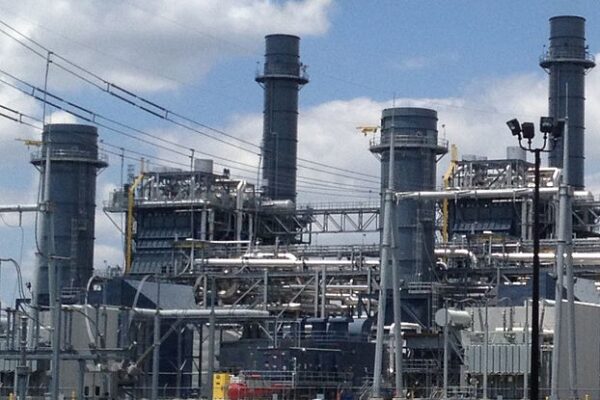
Coal ash community advocates & CWFNC staff in 2019. CWFNC has been involved in the environmental justice fight for coal ash clean-up for over a decade.
Thank you to Jonathan Poston for contributing this article.
Is there a local environmental issue you care about? Consider writing about it for CWFNC’s newsletter & blog!
In 2014, a major spill at a Duke Energy site in Eden, NC, dumped 39,000 tons of coal ash into the Dan River, shining a national spotlight on the issue. Now, the region has multiple coal ash ponds that threaten the local environment, especially around lakes, rivers, and groundwater supplies.
Duke Energy, the state’s largest energy company, has been at the center of the controversy. The company is responsible for managing several coal ash storage sites, some of which are located near major waterways like the Neuse and Cape Fear rivers.
Over time, toxic chemicals and heavy metals from these sites have seeped into the groundwater, impacting drinking water for nearby communities. These toxic elements can contaminate drinking water supplies and affect air quality. This leads to increased risk of cancer,respiratory diseases, and neurological damage. Local ecosystems are also at risk, as coal ash can harm aquatic life and pollute soil, disrupting the balance of regional biodiversity.
Local Response in the Triangle
The Triangle area (Raleigh, Durham, Chapel Hill) of North Carolina, known for its vibrant communities and research institutions, has also struggled with coal ash contamination. Most of the impact is visible in Chapel Hill where there is a highly publicized coal ash site that was discovered only in 2013, after 40-50 years of contaminating groundwater. However, nearby residents use the town’s public water system, protecting their access to safe drinking water.
 The issue has become a focal point of environmental activism, as residents and organizations work to combat its damaging effects in Chapel Hill. The coal ash site is located at 828 Martin Luther King Jr. Blvd., the Chapel Hill Police Department headquarters. This site contains coal ash and construction debris from the 1960s and 1970s, discovered by the Town in 2013. Since then, the Town has worked with the North Carolina Department of Environmental Quality (NCDEQ) to follow all environmental laws and ensure public health and safety.
The issue has become a focal point of environmental activism, as residents and organizations work to combat its damaging effects in Chapel Hill. The coal ash site is located at 828 Martin Luther King Jr. Blvd., the Chapel Hill Police Department headquarters. This site contains coal ash and construction debris from the 1960s and 1970s, discovered by the Town in 2013. Since then, the Town has worked with the North Carolina Department of Environmental Quality (NCDEQ) to follow all environmental laws and ensure public health and safety.
(Photo on left: a sign indicates the site of Chapel Hill’s coal ash disposal site remediation project)
In January of this year (2024) the EPA began considering adding the Chapel Hill coal ash site to the superfund list. And, as of July of this year the NC Dept of Environmental Quality (NC – DEQ) proposed that the coal ash site should be capped.
While these are positive steps, locals dispute whether simply covering the site with a few feet of clean fill really mitigates the risks of arsenic and radium, along with the 18 other toxic chemicals found amid the waste.
Note: From 2014 -2019, CWFNC and the Alliance of Carolinians Together Against Coal Ash worked to organize for well testing, filtration systems for contaminated wells and a complete removal of all Duke coal ash to above ground storage in impermeable sites We recently learned that some filtration systems are failing and will be working with residents to organize to get failing systems fixed




